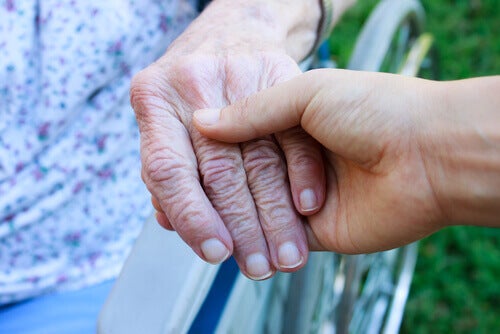How to take care of the other people who depend on us, without letting the situation exhaust us and consume us?
You don’t know how, but one day your parents can’t take care of themselves. These people who seemed invincible have aged and you have to start taking care of them. Suddenly, he finds he’s taking on responsibilities he didn’t want and thought he never had to do.
- But you love them and they gave everything for you.
- How can we not take care of them now that they need it most.
- After all the sacrifices they made to make you have a good life?.
- The truth is that you feel increasingly nervous.
- And upset about being in this situation.
- Are you a bad son?.
“Help your fellowmen carry their weight, but don’t consider yourself forced to wear them. -Pythagoras-
Being involved in the task of caring for someone who can no longer take care of themselves can lead to considerable stress. On the one hand, we’re with a loved one who’s not who he was before. We see behavioral and memory problems arise, in addition to physical and mental weakness.
This leads us to constantly monitor this person, as well as to control their food and / or hygiene, all this can be unpleasant, which can lead us to perform these tasks reluctantly.
Stress is not only associated with taking good care of others, it also extends to other areas of our lives, so work, economic, marital or family problems can arise. Is there any kind of contagion effect? That leads to conflicts in our daily lives.
Increased stress can cause emotional, social, and physical problems in the caregiver.
It is normal for negative emotions, such as anxiety, anger or sadness, to appear, as well as guilt of feeling that the situation is beyond our control or a desire to be anywhere other than caring for that person, which conflicts with the moral obligation to care for our parents.
“The help that is needed, even if it is small, helps a lot. -Matthew German-
On the other hand, our social relationships are undermined, either by the lack of time to be with other people, or by the conflicts caused by the unrest we feel, this, in turn, can cause negative emotions to reappear, so establishing a circle of negative affection.
On a physical level, many diseases can occur. From a variety of psychosomatic disorders (i. e. , physical illnesses caused or aggravated by emotional and psychological factors) to problems related to certain care tasks, such as helping them move.
Today, many people care about elderly parents, why don’t they go through all the psychological, social and physical problems we’ve seen here?Because each person’s resources and situations vary greatly, as do other psychological disorders.
The strategies used to manage stress are very important to protect us from this stress, because the problem is not so much what is going on, but what we are doing and how we are dealing with the situation. In this sense, ruminating and turning our heads in the bad times we are going through or trying to avoid these situations will not help.
“A wonderful energy appears in helping someone. -Mary Lou Cook-
On the contrary, trying to find the best option and putting into practice what we believe we are helping (i. e. acting) without fear of making mistakes is very beneficial, in fact, who is not wrong?And who has never heard that this is how you learn?
But no matter how the person handles the situation, we cannot forget another great help: social support. Do we need strong interpersonal ties, so that others can help us in the most varied tasks, understand us, recognize our value, and want to share with us the burden of compassion?After all, you have to take care of yourself so you can take good care of others!
Images courtesy of Jake Thacker, JD Mason and Cathal Mac An Bheatha.

